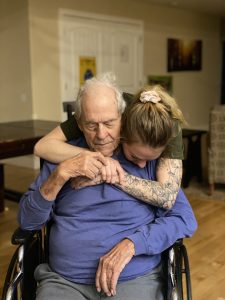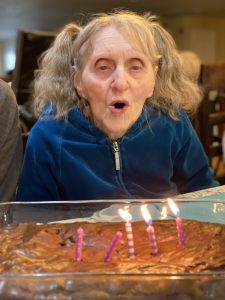
Treating Dementia

There is no cure for Dementia, but there are several prescription medications that have been proven to be very effective during the early stages of Dementia. The type of medication a doctor will prescribe will most importantly depend on the specific needs of the individual, also taking into consideration potential side effects, how easy it is to administer and of course, with today’s economy, cost is also a deciding factor.
The following drugs are prescribed to specifically slow down the negative effects that dementia can cause on a patient’s brain. These drugs are Cholinesterase Inhibitors.
The three main cholinesterase inhibitors that are frequently used are:
- Aricept (generic = donepezil)
- Razadyne (generic – galantamine)
- Exelon (generic – rivastigmine)
Cognex (generic name: Tacrine) is rarely prescribed anymore because of its serious side effects.
The 3 drugs listed above are prescribed during the early to moderate stages of treating dementia. The side effects are few and manageable if they occur at all. Most reported side effects are gastrointestinal issues (such as loss of appetite, nausea, and/or diarrhea). These medications will not stop the progression of the disease, but only slow down the process, so that the patient has more quality time with family and friends.
Memantine (brand name – Namanda) is a fairly new drug used in the treatment of vascular dementia and Alzheimer’s disease. The above listed medication works at trying to improve the communication between the cells in the brain. Memantine helps brain cells from “burning out” too quickly due to an overload of glutamate. Memory and ability is significantly improved in patients that take Memantine, as prescribed, compared to patients that have not taken this medication. Memantine is prescribed for patients that have reached middle to late stages of this disease or for individuals that the cholinesterase inhibitors are no longer working as well as they once did. The most common side effects reported when using the drug Memantine are headaches, constipations and possible dizziness. The drug is not recommended for people who suffer from liver or kidney disease or any sort of seizures.
Dementia is scary and upsetting to most as they begin to lose their independence and ability to perform daily tasks alone. If panic attacks become uncontrollable, there are prescription medications on the market that are helpful in creating a calming and relaxing feeling. These brand drug names with generic names in parentheses are: Ativan (lorazepam), Buspar ( buspirone), Klonopin (clonazepam), Valium (diazepam), Xanax (alprazolam) and Serax (oxazepam).
Often times, as Dementia progresses, the patient is unable to distinguish between what is real and what is imagined in their brain. A patient at this stage might experience hallucinations, get hostile, agitated or uncooperative. When anti-anxiety medications, like the ones listed above, are not effective enough, there are Antipsychotics drugs that can be prescribed to help manage these more difficult behaviors. These are Zyprexa (olanzepine), Seroquel (quetiapine), Risperdal (risperidone), Geodone (ziprasidone), Clozaril (clozapine), and Abilify (aripiprazole)
Losing one’s independence, the ability to get around and communicating as one once did, can leave a person feeling tired, no desire to eat, no interest in doing things they enjoy. All of these things can easily lead to depression. Prescription drugs can restore the happy mood for these patients. We have listed a few prescription antidepressants that have been proven to work in many people without many side effects. They include: Aventyl (generic name = nortriptyline); celexa (citalopram); Effexor (venlafaxine); Paxil (paroxetine); Prozac (flouxetine); Zoloft (sertraline).
Due to the types of medications prescribed, to keep Dementia and the symptoms under control this may cause one to become drowsy, causing a patient to nap more frequently during the day and having difficulty going to sleep at a designated time. A note to the caregiver would be to limit the naps that are taken during the day by their loved one and the possibility of increasing their activities during the day. If medication is needed to get proper rest for the patient, Ambien (generic name = zolpidem), Restoril (generic name = temazepam) or sonata (generic name = zaleplon) can be prescribed by the health care professional.
There are also some non-prescription therapeutic ways to assist a dementia patient with memory recall and relaxation. Massage therapy and Acupuncture are both wonderful alternatives as they increase blood flow throughout the body. This type of therapy is another way of incorporating the therapy of touch, as touch is a known stress reliever. Music, art and aromatherapy can be helpful with dementia patients as it may trigger an experience through smells, sights and sounds.
There are many options when it comes to the treatment of dementia symptoms, a few of which we have listed here. All decisions related to a dementia diagnosis and medications listed, should be discussed with a healthcare professional.
In Conclusion:

We hope that if you are a family who is looking for a long-term care solution for your loved one, that you will call or come by to visit with us about your current challenges and the goals you have for your loved one. We are a community built on love, support and open communication, and anything that we can do, through education and information, we are happy to provide in hopes of helping you advocate for your loved one.
If you have experienced a realization that your loved one needs more help than you can give, and that you feel you have very little time to make such an important decision, we are here to help you make that sometimes life-changing choice. Whether Applewood Our House is the right choice, or another senior housing option is the best choice, let us help you find the best fit for your loved one; one that best meets their needs, maximizes their independence and enhances the quality of their life.
Warmest Regards,
All of us at Applewood Our House
“Caregiving often calls us to lean into love we did not know possible.”







